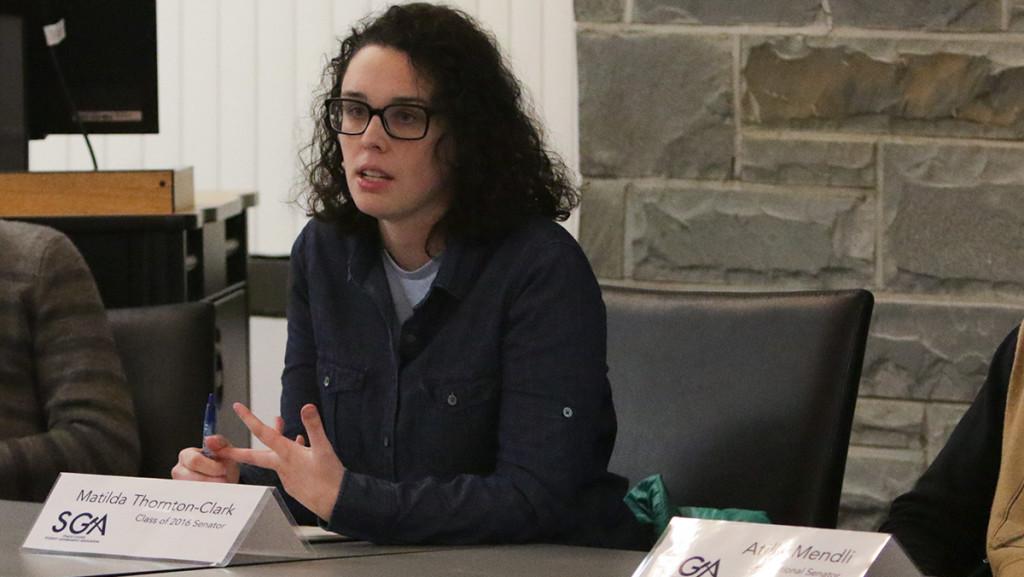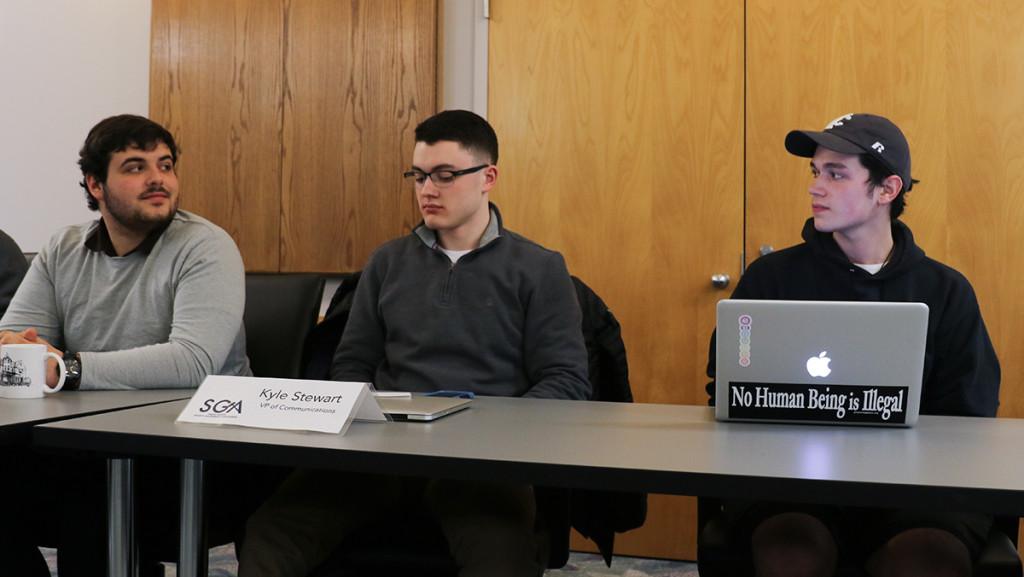The Ithaca College Student Government Association Senate has elected a new interim vice president of campus affairs.
At the Feb. 15 meeting, the senate voted 11–1 to appoint sophomore Luis Torres to the seat of interim vice president. Prior to his appointment, he did not hold any seat in the SGA.
The executive board spent the days preceding the meeting searching for a new nominee following the Senate’s vote against the appointment of Class of 2016 senator Matilda Thornton-Clark on Feb. 8.
In his speech before the Senate, Torres said his qualifications for the interim position include public relations officer for PODER, a group that seeks to unite students of Hispanic and Latino descent; co-chair for Active Minds at Ithaca College, a mental health advocacy group; involvement with the POC at IC movement; and an internship with DoSomething.org, an advocacy group aimed at getting young people involved in issues of social justice. Torres said topics he hopes to address are race issues, mental health and intersectionality.
“Although I know I can bring to the table an understanding of the student body and a passion to get things done, this position will help me learn ways to help the student body even more,” Torres said.
Senate Chair sophomore Marieme Foote said the whole process of appointing a permanent vice president will most likely take two weeks and that Torres’ term will conclude when a permanent vice president is chosen by the executive board. The application is available on OrgSync and the SGA Facebook page.
SGA President Dominick Recckio said the new interim will join him in the annual student affairs and campus life meeting, which is an opportunity to speak with the associate provost and chief diversity officer candidly about “campus affairs issues.”
Recckio said Torres offers a new perspective that is not “SGA-centric.”
“Over time, SGA doesn’t do a spectacular job of reaching out to the entire student body and getting perspective,” he said. “I think we think in terms of SGA, and so it’s great to have someone who has the outside perspective.”
Torres’ appointment comes as the latest development in a long and convoluted process that began Jan. 7 when Yena Seo resigned from the vice president position following a request to do so from Recckio and the executive board.
Thornton-Clark was subsequently appointed interim vice president of campus affairs over winter break, but the SGA Senate voted 7–8 against the appointment at its Feb. 8 meeting as the result of concerns that the appointment had not followed the process required by the SGA constitution.
Foote said the decision was the result of the procedural violation involved in Thornton-Clark’s nomination during winter break and was not a reflection of her qualifications.
The decision came after Recckio delayed the vote in two consecutive meetings due to low Senate representation.
During winter break, Recckio said two other people had expressed an interest in the interim vice president of campus affairs position but were not given the same consideration as Thornton-Clark. Recckio said this was because he and some other members of the executive board had already formed a personal relationship with Thornton-Clark.
“As I was preparing to ask Matilda for that role, I had built a personal relationship with Matilda, and other members of the executive board did as well, and that is what is unfair,” Recckio said.

Thornton-Clark was appointed as interim over break without the consent of the Senate, Recckio said. He later said he made that decision without first reading the constitution and did not understand the process as a whole. Thornton-Clark was later approved “symbolically” as the permanent replacement for the position in a Jan. 19 SGA announcement under the assumption that there would be no obstructions in the voting process.
The ambiguous language of the constitution has been the root of confusion. Members of the executive board have admitted the wording in the constitution is unclear, and Foote said it is her job to interpret the constitution and inform the Senate of the actions of the executive board.
The full clause regarding the procedures upon notice of a vacant vice presidential seat in the SGA constitution reads as follows:
“In the time prior to formal selection of a vice presidential candidate replacement the remaining executive shall appoint an appropriate replacement. A permanent replacement will be announced following the interview process. No approval of the Senate is required. A majority approval of the Senate is required to accept the recommendation for a temporary replacement.”
Foote said she does not know the original intent but said she imagines the reason there is a vote on the interim position and not the permanent position is so the executive board can notify the Senate of the empty seat prior to the application process. Foote said, in her reading of the constitution, the Senate must approve an interim vice president before the executive board can officially begin the process to look for the permanent appointee, making Thornton-Clark’s appointment unconstitutional.
Foote said she and senior Evan Layne, vice president of business and finance, were unaware of the initial appointment of Thornton-Clark to the role of interim vice president. Recckio said he met some of the other members of the executive board over winter break individually to discuss the appointment of Thornton-Clark to the interim vice president seat, and a lack of communication led to some members of the executive board not being aware of the this.
Foote said when the Spring 2016 semester began, she raised the unconstitutionality of Thornton-Clark’s appointment to other members of the executive board and said the interim election process had to be reinitiated following the rules of the constitution in order to maintain fairness.
At the meeting Feb. 8, in an effort to maintain transparency and clear confusion within the Senate, members of the executive board spoke to the Senate about the inconsistencies with the constitution in regard to the executive board’s placement of Thornton-Clark in the interim vice president seat and the implications of favoritism that it had. Foote said this would allow the Senate to make an informed decision.
Thornton-Clark said she could understand both sides of the story and that the Senate was confused.
“They didn’t like how things were getting done, and they needed somebody,” Thornton-Clark said. “On the other hand, everyone was confused. It wasn’t explained well at all.”









